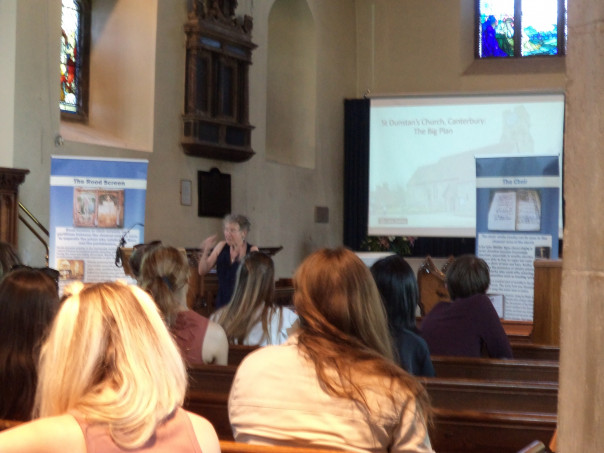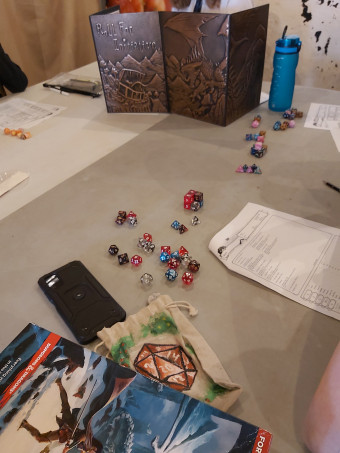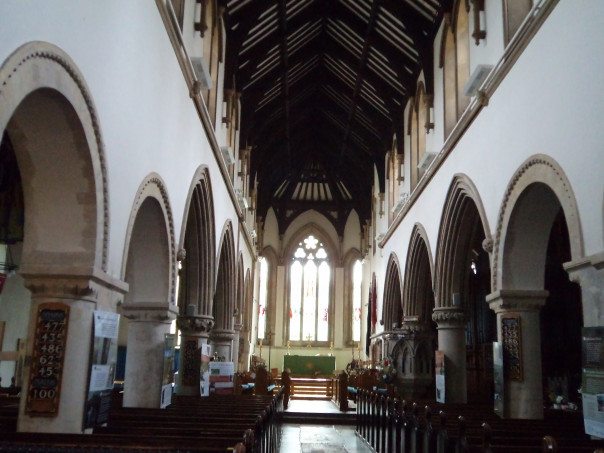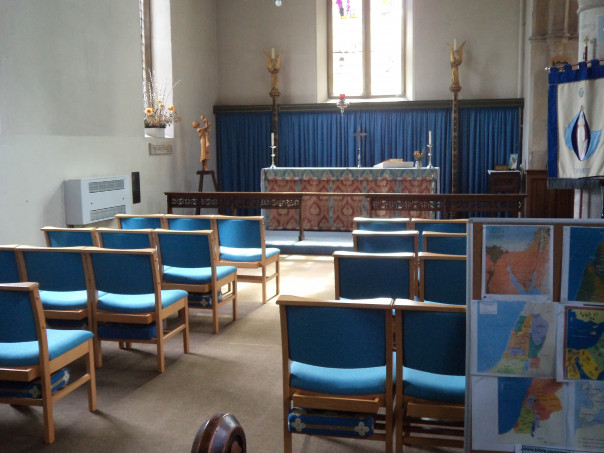This week is more about preparations for events rather than the events themselves, although Dr Diane Heath was at Dover Castle today (Thursday) for a ‘Medieval Animals Heritage’ Dungeons and Dragons day with 30 schoolchildren, because we have a very full week next week, the week after similarly, and it doesn’t get much quieter until we are almost through July. I’ll leave August for the time being!
Furthermore, having joined the University Kent’s MEMS Fest events last Friday 16 June, as well as the panel sessions with some interesting papers by postgraduates, including from the United States, it was great to be able to help out at the St Dunstan’s church visit as a member of the church’s ‘Big Plan’ team. The project is led by Dr Sarah James and education and the community are very much centre stage as a way of providing an informed engagement with the church’s history in a way to make it relevant to people of all ages today. Students from both Kent and Canterbury Christ Church will be getting involved during the next academic year, the project especially beneficial to those interested in heritage. Moreover, this is not the first time CCCU Humanities students have been involved, Beth Woljung and Miranda Owens each researching and compiling material for exhibition banners – see examples on either side of Sarah James in this photo.

Then this week was the second time recently I took part in a discussion about soundscapes. This time it was with Carole Hayman and revolved around the rural landscape of the Rother Levels centring on the medieval Carmelite friary at Lossenham. As well as bringing in the flora and fauna, the rhythm of the farming year, the archaeological excavation and responses to it, we talked about drawing in ‘lost voices’ from the past, especially through the spoken words found in wills and depositions. Hence the tithe case at Rolvenden may rise again, and I’m also wondering where there might also be a way of bringing in the coroner’s inquests that featured in the blog a couple of months ago. More on this as we move forward.
Before I get to CKHH events in July, I thought I would offer a final reminder concerning Dr Diane Heath’s NHLF-funded Medieval Animals Heritage ‘Skin and Bone, Wood and Stone’ conference that runs from Wednesday 28 June to Saturday 1 July, to be followed by Canterbury’s Medieval Pageant on the Saturday where the theme is ‘Medieval Animals’. As well as drawing experts on the cultural aspects of medieval and early modern animals to Canterbury, the conference programme offers a ‘Medieval Animals Heritage’ pop-up exhibition at The Beaney which has been curated by SEND children, a session at Canterbury Cathedral Archives and ‘Fabulous Animal’ poetry readings.

The conference is free to attend but the organisers need to know numbers. Therefore please book the days you would like to attend at: https://www.canterbury.ac.uk/arts-and-culture/event-details.aspx?instance=424806 or email artsandculture@canterbury.ac.uk or call 01227 922994. The lectures will take place at Old Sessions House, Longport on the Canterbury Christ Church University campus, CT1 1PL. Do come and join us for this brilliant conference as the project begins to come to its finale.
Also next week is the Faculty of Arts, Humanities and Education’s annual conference on Thursday 29 July and I think CKHH will be there too where another of the Centre’s funded projects, this time ‘Kent’s Maritime Communities’ will be represented through a presentation on ‘A gateway county: migrants and other travellers in 15th-century Kent’. This project will come up again shortly when we move into July.
As medievalists will know, the first week in July heralds the International Medieval Congress at the University of Leeds and this year I’ll be heading north as a change from Diane who is a regular there to promote her Medieval Animals series with the University of Wales Press, ‘An Introduction to …’. Indeed, the medieval snail will be appearing shortly to join the dragon, ass, swan and fox.

Then on the Thursday 6 July it is the St Thomas More service of commemoration at St Dunstan’s church, Canterbury. The commemoration always includes an address by a distinguished speaker and in 2023 this will be Dr David Rundle, who will speak on ‘From St Dunstan to Thomas More: Canterbury, learning and sanctity’. David is a specialist in the Renaissance in England; Senior Lecturer in Latin and Palaeography and Acting Co-Director, Centre for Medieval and Early Modern Studies, University of Kent. The service begins at 7.30pm and is open to all.
Going back to ‘Kent’s Maritime Communities’ and specifically Dover this time, we are trying out some skills workshops preparatory to engaging in more outreach activities in 2024-25 at several ‘maritime communities’. As mentioned, we have three ‘Working with Wills’ workshops on Saturday 8 July, Monday 17 July and Tuesday 18 July which will take place in St Mary’s church in Dover from 1pm to 4pm. Each workshop is a stand-alone free event, and no previous experience is necessary. We’ll be using wills because they are a great way to start learning how to read ‘old handwriting’, as well as finding out about the lives of ordinary medieval people – their beliefs, what they had in their houses, and many other things in this port town. If this sounds interesting and fun, why not join us by booking your free place at: https://bit.ly/WillsDoverJuly or email artsandculture@canterbury.ac.uk or call 10112 922994.

I’m very grateful to the Revd Catherine Tucker for agreeing to host these workshops and today (Thursday), I went down to visit her at St Mary’s. It is a fabulous medieval church and thus very fitting for these workshops. We discussed the best place to hold them and decided on the Lady Chapel which is a lovely space. To complement the workshops and to be part of the town’s annual celebration of its maritime heritage, we will be setting up a small temporary exhibition of six pop-up banners in and around the Lady Chapel. The topics of these are: Merchants and Mariners; Pilgrims and Passengers; Fishing and Fishermen; Supporting the Saints; Care in the Community, and Houses and Households. There will also be a free information sheet available that visitors will be most welcome to take away with them. Times when the church will be open have yet to be finalised, but if you are in the town, please do come and explore the exhibition and church.
Anther CKHH event taking place in July will be a talk at Eastbridge, Canterbury entitled Eastbridge, Pilgrimage and Late Medieval Canterbury on Thursday 27 July at 3pm, space is limited so please call 01227 471688. The Lossenham Project wills group will be meeting down at Lossenham on Thursday 20 July, while the Kent History Postgraduates have three more meetings, including Tracey Dessoy’s presentation before breaking for August. Diane, of course, has more Medieval Animals Heritage events lined up – details to follow.
Finally, but most importantly, the Becket Lecture is just over a fortnight away. We are delighted that the acclaimed historian Michael Wood will speak on ‘“The Happiest Time”: Theodore and Hadrian and the School of Canterbury’. The lecture on Tuesday 11 July at 6pm will take place in Powell Lecture Theatre Pg09 (on the main CCCU Canterbury campus CT1 1NU), with a drinks reception beforehand in the foyer next to the Touchdown café from 5.30pm due to the generosity of the Vice Chancellor. The CCCU Bookshop will be on hand, and copies of Michael’s new revised and extended In Search of the Dark Ages (paperback edition) will be available etc. Further details and how to book can be found at bit.ly/Becket2023 or email artsandculture@canterbury.ac.uk or call 01227 922994.
 Centre for Kent History and Heritage
Centre for Kent History and Heritage Sheila Sweetinburgh
Sheila Sweetinburgh 1708
1708


I thought the Becket Lecture on Tuesday, 11th July was now in the Michael Berry Lecture Theatre – ?
Thanks but NO, the Becket Lecture has been advertised as being in the Powell Lecture Theatre and that is where it will take place, with the wine reception in the area next to Touchdown (signposted on the day). Old Sessions is being refurbished during July. Sheila